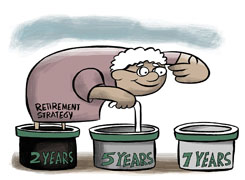Samraat Jadhav |2508 Answers |Ask -Follow
Stock Market Expert - Answered on Mar 24, 2024
He is a SEBI-registered investment and research analyst and has over 18 years of experience in managing high-end portfolios.
A management graduate from XLRI-Jamshedpur, Jadhav specialises in portfolio management, investment banking, financial planning, derivatives, equities and capital markets.... more

Thanks Samrat. I only know about NiftyBees, ItBees, BankBees. Can you suggest some more.
Inception
Date AUM (Rs crore)
Volume (Rs crore)
1
Nippon India ETF Nifty BeES
28-Dec-01
5946
351.14
2
SBI ETF Nifty 50
22-Jul-15
123115
139.97
3
ICICI Prudential Nifty ETF
20-Mar-13
3157
30.50
4
Kotak Nifty ETF
2-Feb-10
1560
6.54
5
HDFC NIFTY 50 ETF
9-Dec-15
1265
4.21
6
Mirae Asset Nifty 50 ETF
19-Nov-18
713
3.33
7
UTI Nifty ETF
1-Sep-15
32273
2.63
8
Axis Nifty ETF
3-Jul-17
116
1.01
9
Quantum Nifty 50 ETF - Growth
10-Jul-08
14
0.40
10
Motilal Oswal M50 ETF
28-Jul-10
29
0.25
11
Aditya Birla Sun Life Nifty ETF
21-Jul-11
537
0.20
12
LIC MF ETF - Nifty 50
20-Nov-15
639
0.14
13
DSP Nifty 50 ETF
23-Dec-21
22
0.12
14
Tata Nifty Exchange Traded Fund
3-Jan-19
433
0.11
15
IDFC Nifty ETF
7-Oct-16
16
0.10
16
Indiabulls Nifty50 ETF
30-Apr-19
17
0.05
17
Invesco India Nifty ETF
13-Jun-11
62
0.04
Source: NSE; AUM as of Jan 31, 2022; volume for Feb 24, 2022
You may like to see similar questions and answers below
Advait Arora | Answer |Ask -Follow
Financial Planner - Answered on Aug 28, 2023
Ramalingam Kalirajan |10893 Answers |Ask -Follow
Mutual Funds, Financial Planning Expert - Answered on Jul 25, 2024
Samraat Jadhav |2508 Answers |Ask -Follow
Stock Market Expert - Answered on Jan 13, 2025
Radheshyam Zanwar |6746 Answers |Ask -Follow
MHT-CET, IIT-JEE, NEET-UG Expert - Answered on Aug 11, 2025
Nitin Narkhede |113 Answers |Ask -Follow
MF, PF Expert - Answered on Dec 15, 2025
Nitin Narkhede |113 Answers |Ask -Follow
MF, PF Expert - Answered on Dec 15, 2025
Ramalingam Kalirajan |10893 Answers |Ask -Follow
Mutual Funds, Financial Planning Expert - Answered on Dec 15, 2025
Ramalingam Kalirajan |10893 Answers |Ask -Follow
Mutual Funds, Financial Planning Expert - Answered on Dec 15, 2025
Radheshyam Zanwar |6746 Answers |Ask -Follow
MHT-CET, IIT-JEE, NEET-UG Expert - Answered on Dec 15, 2025
Ramalingam Kalirajan |10893 Answers |Ask -Follow
Mutual Funds, Financial Planning Expert - Answered on Dec 15, 2025
Ramalingam Kalirajan |10893 Answers |Ask -Follow
Mutual Funds, Financial Planning Expert - Answered on Dec 15, 2025
Ramalingam Kalirajan |10893 Answers |Ask -Follow
Mutual Funds, Financial Planning Expert - Answered on Dec 15, 2025
Samraat Jadhav |2508 Answers |Ask -Follow
Stock Market Expert - Answered on Dec 15, 2025
Ramalingam Kalirajan |10893 Answers |Ask -Follow
Mutual Funds, Financial Planning Expert - Answered on Dec 15, 2025


























